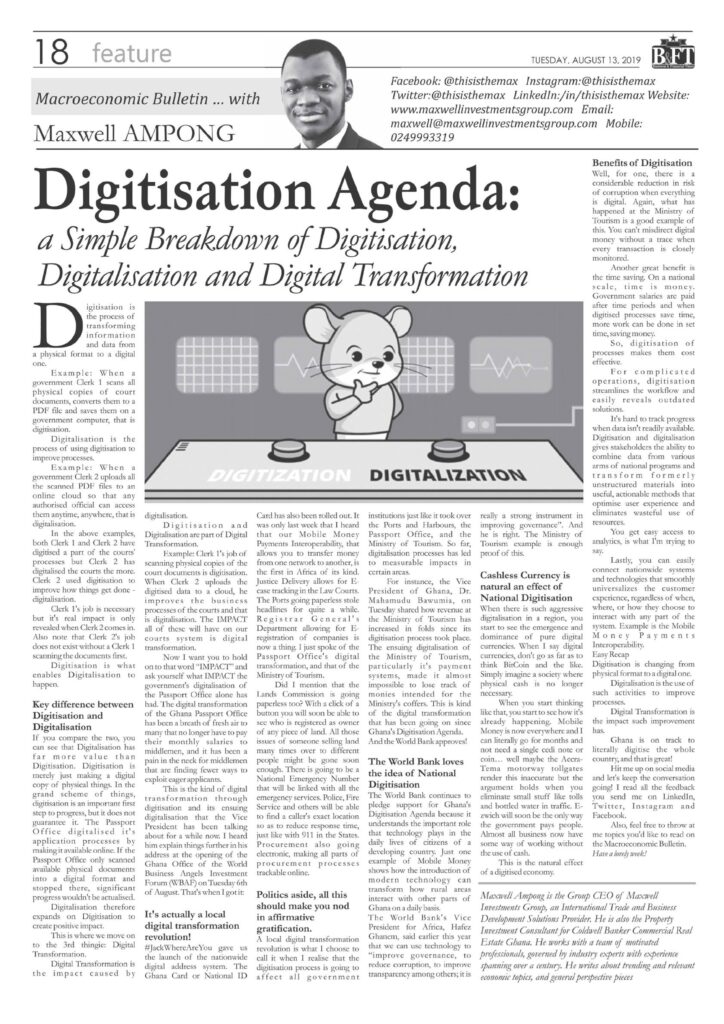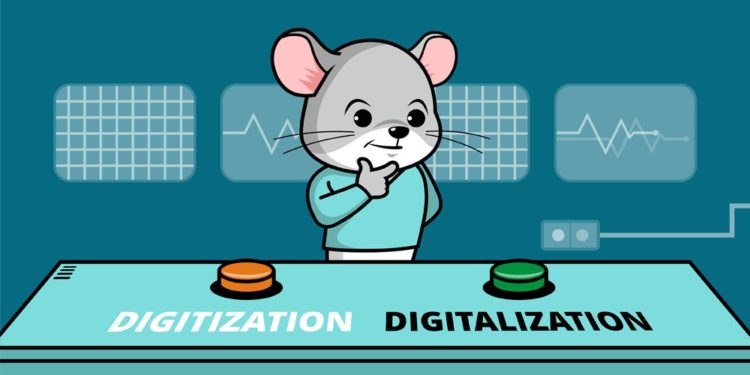
Digitisation is the process of transforming information and data from a physical format to a digital one.
Example: When a government Clerk 1 scans all physical copies of court documents, converts them to a PDF file and saves them on a government computer, that is digitisation.
Digitalisation is the process of using digitisation to improve processes.
Example: When a government Clerk 2 uploads all the scanned PDF files to an online cloud so that any authorised official can access them anytime, anywhere, that is digitalisation.
In the above examples, both Clerk 1 and Clerk 2 have digitised a part of the courts’ processes, but Clerk 2 has digitalised the courts the more. Clerk 2 used digitisation to improve how things get done – digitalisation.
Clerk 1’s job is necessary but it’s real impact is only revealed when Clerk 2 comes in. Also note that Clerk 2’s job does not exist without a Clerk 1 scanning the documents first.
Digitisation is what enables Digitalisation to happen.
Key difference between Digitisation and Digitalisation
If you compare the two, you can see that Digitalisation has far more value than Digitisation. Digitisation is merely just making a digital copy of physical things. In the grand scheme of things, digitisation is an important first step to progress, but it does not guarantee it. The Passport Office digitalised its application processes by making it available online. If the Passport Office only scanned available physical documents into a digital format and stopped there, significant progress wouldn’t be actualised.
Digitalisation therefore expands on Digitisation to create positive impact.
This is where we move on to the 3rd thingie: Digital Transformation.
Digital Transformation is the impact caused by digitalisation.
Digitisation and Digitalisation are part of Digital Transformation.
Example: Clerk 1’s job of scanning physical copies of the court documents is digitisation. When Clerk 2 uploads the digitised data to a cloud, he improves the business processes of the courts and that is digitalisation. The IMPACT all of these will have on our courts system is digital transformation.
Now I want you to hold on to that word “IMPACT” and ask yourself what IMPACT the government’s digitalisation of the Passport Office alone has had. The digital transformation of the Ghana Passport Office has been a breath of fresh air to many that no longer have to pay their monthly salaries to middlemen, and it has been a pain in the neck for middlemen that are finding fewer ways to exploit eager applicants.
This is the kind of digital transformation through digitisation and its ensuing digitalisation that the Vice President has been talking about for a while now. I heard him explain things further in his address at the opening of the Ghana Office of the World Business Angels Investment Forum (WBAF) on Tuesday 6th of August. That’s when I got it:
It’s actually a local digital transformation revolution!
#JackWhereAreYou gave us the launch of the nationwide digital address system. The Ghana Card or National ID Card has also been rolled out. It was only last week that I heard that our Mobile Money Payments Interoperability, that allows you to transfer money from one network to another, is the first in Africa of its kind. Justice Delivery allows for E-case tracking in the Law Courts. The Ports going paperless stole headlines for quite a while. Registrar General’s Department allowing for E-registration of companies is now a thing. I just spoke of the Passport Office’s digital transformation, and that of the Ministry of Tourism.
Did I mention that the Lands Commission is going paperless too? With a click of a button you will soon be able to see who is registered as owner of any piece of land. All those issues of someone selling land many times over to different people might be gone soon enough. There is going to be a National Emergency Number that will be linked with all the emergency services. Police, Fire Service and others will be able to find a caller’s exact location so as to reduce response time, just like with 911 in the States. Procurement also going electronic, making all parts of procurement processes trackable online.
Politics aside, all this should make you nod in affirmative gratification.
A local digital transformation revolution is what I choose to call it when I realise that the digitisation process is going to affect all government institutions just like it took over the Ports and Harbours, the Passport Office, and the Ministry of Tourism. So far, digitalisation processes has led to measurable impacts in certain areas.
For instance, the Vice President of Ghana, Dr. Mahamudu Bawumia, on Tuesday shared how revenue at the Ministry of Tourism has increased in folds since its digitisation process took place. The ensuing digitalisation of the Ministry of Tourism, particularly it’s payment systems, made it almost impossible to lose track of monies intended for the Ministry’s coffers. This is kind of the digital transformation that has been going on since Ghana’s Digitisation Agenda.
And the World Bank approves!
The World Bank loves the idea of National Digitisation
The World Bank continues to pledge support for Ghana’s Digitisation Agenda because it understands the important role that technology plays in the daily lives of citizens of a developing country. Just one example of Mobile Money shows how the introduction of modern technology can transform how rural areas interact with other parts of Ghana on a daily basis.
The World Bank’s Vice President for Africa, Hafez Ghanem, said earlier this year that we can use technology to “improve governance, to reduce corruption, to improve transparency among others; it is really a strong instrument in improving governance”. And he is right. The Ministry of Tourism example is enough proof of this.
Cashless Currency is natural an effect of National Digitisation
When there is such aggressive digitalisation in a region, you start to see the emergence and dominance of pure digital currencies. When I say digital currencies, don’t go as far as to think BitCoin and the like. Simply imagine a society where physical cash is no longer necessary.
When you start thinking like that, you start to see how it’s already happening. Mobile Money is now everywhere, and I can literally go for months and not need a single cedi note or coin… well maybe the Accra-Tema motorway tollgates render this inaccurate, but the argument holds when you eliminate small stuff like tolls and bottled water in traffic. E-zwich will soon be the only way the government pays people. Almost all business now has some way of working without the use of cash.
This is the natural effect of a digitised economy.
Benefits of Digitisation
Well, for one, there is a considerable reduction in risk of corruption when everything is digital. Again, what has happened at the Ministry of Tourism is a good example of this. You can’t misdirect digital money without a trace when every transaction is closely monitored.
Another great benefit is the time saving. On a national scale, time is money. Government salaries are paid after time periods and when digitised processes save time, more work can be done in set time, saving money.
So, digitisation of processes makes them cost effective.
For complicated operations, digitisation streamlines the workflow and easily reveals outdated solutions.
It’s hard to track progress when data isn’t readily available. Digitisation and digitalisation gives stakeholders the ability to combine data from various arms of national programs and transform formerly unstructured materials into useful, actionable methods that optimise user experience and eliminates wasteful use of resources.
You get easy access to analytics, is what I’m trying to say.
Lastly, you can easily connect nationwide systems and technologies that smoothly universalizes the customer experience, regardless of when, where, or how they choose to interact with any part of the system. Example is the Mobile Money Payments Interoperability.
Easy Recap
Digitisation is changing from physical format to a digital one.
Digitalisation is the use of such activities to improve processes.
Digital Transformation is the impact such improvement has.
Ghana is on track to literally digitise the whole country, and that is great!
I hope you found this article insightful and enjoyable. Subscribe to the ‘Entrepreneur In You’ newsletter here: https://lnkd.in/d-hgCVPy.
I wish you a highly productive and successful week ahead!
♕ —- ♕ —- ♕ —- ♕ —- ♕
Disclaimer: The views, thoughts, and opinions expressed in this article are solely those of the author, Dr. Maxwell Ampong, and do not necessarily reflect the official policy, position, or beliefs of Maxwell Investments Group or any of its affiliates. Any references to policy or regulation reflect the author’s interpretation and are not intended to represent the formal stance of Maxwell Investments Group. This content is provided for informational purposes only and does not constitute legal, financial, or investment advice. Readers should seek independent advice before making any decisions based on this material. Maxwell Investments Group assumes no responsibility or liability for any errors or omissions in the content or for any actions taken based on the information provided.


